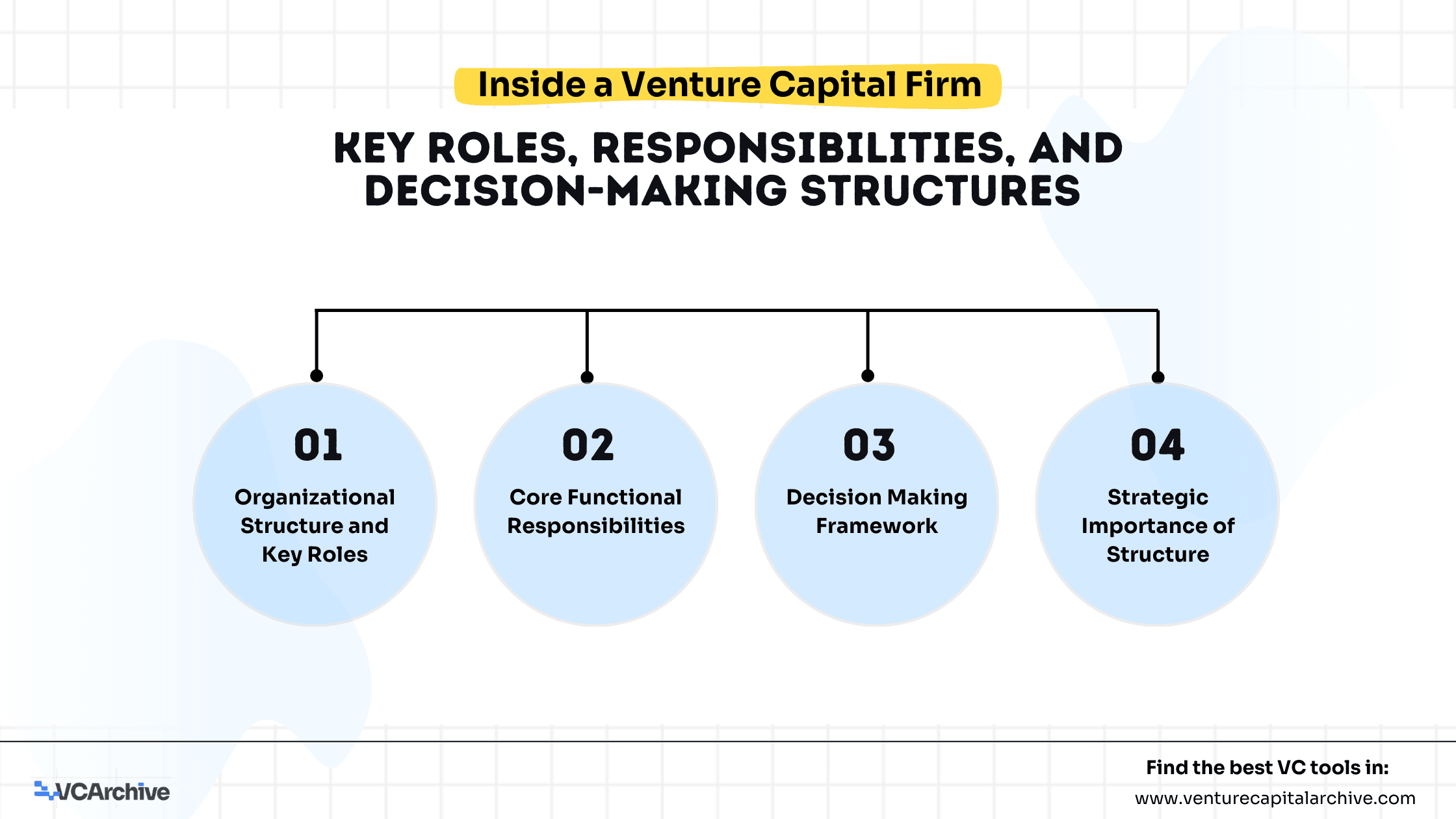
Inside a Venture Capital Firm: Understanding Key Roles, Responsibilities, and Decision-Making Dynamics

A thorough understanding of this internal structure is essential for entrepreneurs seeking capital, professionals pursuing a career in venture capital, and institutional investors evaluating fund managers.
Organizational Structure and Key Roles
A venture capital firm’s success depends on the seamless integration of leadership, investment teams, and operational support. Although structures vary, most firms follow a hierarchy that includes:
General Partners (GPs)
Senior equity holders who define the investment thesis, raise capital from limited partners (LPs), and hold ultimate authority over capital deployment.
Partners or Managing Directors
Senior investors who lead deal origination, negotiate investment terms, and oversee strategic engagement with portfolio companies.
Principals
Mid-senior professionals who manage transactions from due diligence through closing while cultivating deal flow and maintaining industry networks.
Associates
Analytical professionals who conduct financial modeling, market research, and early-stage due diligence to support investment decisions.
Analysts
Entry-level professionals focused on opportunity sourcing, data gathering, and maintaining industry intelligence.
Operating Partners and Advisors
Specialists who provide functional and sector-specific expertise to strengthen portfolio companies.
Core Functional Responsibilities
Deal Origination
Sourcing opportunities through founder networks, accelerators, industry events, and co-investor relationships while ensuring alignment with the firm’s strategic focus.
Due Diligence
Conducting comprehensive evaluations of a target company’s market position, financial performance, product roadmap, and competitive landscape, often with input from external experts to validate assumptions and assess risk.
Investment Committee Review
Presenting investment opportunities in a structured format, followed by rigorous discussion and analysis at the partner level, leading to consensus or majority approval in accordance with the firm’s governance model.
Portfolio Management
Engaging with portfolio companies through strategic oversight, board participation, and access to the firm’s network while monitoring performance metrics to guide follow-on investment and exit strategies.
Limited Partner Relations and Fund Administration
Providing transparent communication of fund performance, pipeline activity, and market insights, while ensuring strict adherence to fiduciary duties and regulatory compliance.
Decision-Making Framework
The investment process within a venture capital firm generally follows a disciplined sequence:
Preliminary Screening
Evaluating opportunities based on strategic fit and initial viability.
Detailed Due Diligence
Conducting in-depth analysis of business fundamentals, market dynamics, and financial performance.
Partner Deliberation
Collaboratively assessing the investment’s potential return profile and associated risks.
Investment Committee Approval
Formally authorizing capital deployment, often involving binding allocation decisions.
Post-Investment Stewardship
Providing ongoing governance, strategic support, and value creation to maximize portfolio performance.
Strategic Importance of Structure
An effective internal structure enables a venture capital firm to operate with clarity, accountability, and strategic precision. For entrepreneurs, understanding this framework informs targeted engagement with the right stakeholders. For limited partners, it offers transparency into governance and capital deployment discipline. For professionals entering the sector, it defines clear career progression pathways and performance expectations.
In venture capital, disciplined processes and well-defined roles are not administrative formalities but strategic advantages. The firms that consistently achieve superior results do so by integrating informed decision-making, specialized expertise, and aligned incentives at every level of the organization. Whether the objective is to secure funding, establish a partnership, or build a career in the sector, a comprehensive understanding of the internal operations of a venture capital firm provides a decisive advantage in navigating one of the most competitive arenas in global finance.